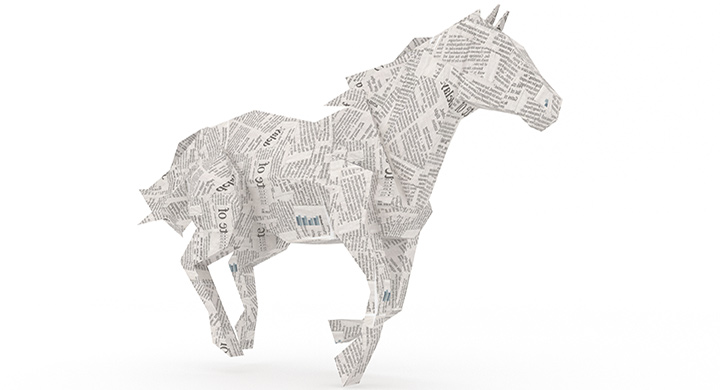2200007 - Equine Journalism
Course Description

Equine Journalism provides the necessary tools, techniques, and knowledge to help you develop compelling content suitable for publishing in both mainstream and equine journalism outlets. Publishers/editors seek writers and producers who can create superior content for a variety of audiences.
This course has been designed as a journey that starts with understanding the media environment and its needs, developing a story idea through research, interviewing, and data analysis, writing and/or producing the piece, revising/editing, and finally pitching and negotiating a contract. You will learn how to self-edit, understand contracts and copyright rules, and how to prepare a full multimedia package for your story. We’ll also talk about launching and running a freelance business and using your equine knowledge to position yourself as a columnist or expert.
Learning Outcomes
Upon successful completion of this course, you will be able to:
- Consider journalism ethics as it applies to the equine publishing industry and your role as a writer/producer of content and stories.
- Apply best practices for research, data use and interviewing techniques to develop a compelling story idea.
- Write or produce a piece (article, podcast or video) using storytelling techniques.
- Revise and polish a piece (article, podcast or video) for publication with recognition and copyright requirements.
- Recognize the different types of media platforms and develop your story idea to be delivered to audiences across multiple platforms.
- Describe the importance of visual journalism in today's multimedia environment and produce original visual materials to complement your piece.
- Identify different story pitching techniques and develop a professional pitch directed to a publisher.
- Interact with publishers and interpret a contributor's contract.
- Recognize the tenets of professionalism and apply them to your equine journalism career.
Course Topics
- The Professional Equine Journalist
- The Ethical Media Landscape
- Content and Audience
- Research and Reporting Methods
- Interviewing Techniques
- Storytelling in Equine Journalism
- Storytelling in Equine Science Journalism
- Visual Storytelling and Photojournalism
- The Art of Revision
- Finalizing and Marketing Your Project
- The Business of Equine Journalism
- Wrapping Up: The Future
Sample Careers
Equine Journalism is designed for anyone producing content in the equine industry and those interested in developing skills in storytelling, writing and digital communication (photography, video, podcasts) in the equine industry.
Additional Requirements
- This course is intended for adult learners who are at least 18 years of age.
- There are no prerequisites for this course.
- You may take this as an individual course or choose to complete one of our equine certificates or the diploma.
- You do not need access to a horse or facility to participate and be successful in this course.
- You can expect to spend 6-10 hours per week to complete the course material, activities, discussions and assignments.
Assessment
| Assessment Item | Weight |
|---|---|
| Participation and Discussion | 20% |
| Critique | 20% |
| Individual Project | 50% |
| Showcase | 10% |
| Total | 100% |
Please note that the course assessment is subject to change.
Sponsoring Partner
Applies Towards the Following Certificates
- Diploma in Equine Studies : Electives
- Certificate in Equine Business Management : Electives
Technical Requirements
You are responsible for ensuring that your computer system meets the necessary system requirements. Use the browser check tool to ensure your browser settings are compatible and up to date (results will be displayed in a new browser window).
*Course details are subject to change.

